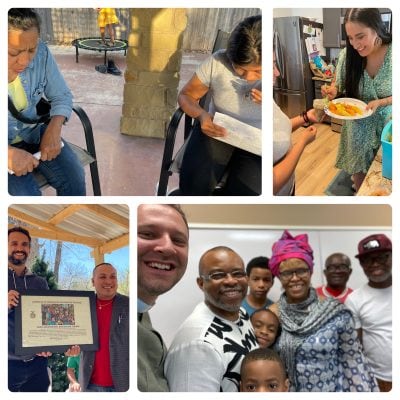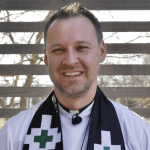by the Rev. Jonathan Kindberg, Diaspora Mobilizer of C4SO’s Diaspora Network
Last month I attended a Lausanne-sponsored consultation on Global Diaspora held in South Africa. As a White American, I was delighted to be a marked minority. Nigerians, Indians, Chinese and Koreans shared testimonies of diaspora mission and ministry throughout the world. There were Sri Lankans serving middle eastern refugees in Europe, Indians planting churches in Canada, and many had diaspora connections to Austin and Texas [where I currently live and work]. It was a living picture of new reality for the Church.
 Addressing this new reality is the reason I felt compelled to launch C4SO’s new Diaspora Network earlier this year, with the mission of encouraging and mobilizing immigrant churches and leaders. Since at least the 1970s, it’s been clear that the center of gravity for the Church has shifted to the Global South (Asia, Latin America and Africa). What many of us have not yet come to terms with is that this shift is also now underway in the U.S. Church thanks to migration and diaspora. The majority of immigrants migrating to the United States are Christians from the Global South. They and their children (the 2nd Generation) are quickly becoming the growing majority of the Church in the United States—particularly as White American churches decline.
Addressing this new reality is the reason I felt compelled to launch C4SO’s new Diaspora Network earlier this year, with the mission of encouraging and mobilizing immigrant churches and leaders. Since at least the 1970s, it’s been clear that the center of gravity for the Church has shifted to the Global South (Asia, Latin America and Africa). What many of us have not yet come to terms with is that this shift is also now underway in the U.S. Church thanks to migration and diaspora. The majority of immigrants migrating to the United States are Christians from the Global South. They and their children (the 2nd Generation) are quickly becoming the growing majority of the Church in the United States—particularly as White American churches decline.
We can be tempted (either as outsiders or as immigrant leaders ourselves) to denigrate immigrant congregations as small and without much influence or importance—much in the same way that the Western Church denigrated the importance of the Global South prior to the 1970s. Yet, leaders at this consultation in South Africa shared that 60% of Sunday church attendees in London are Black diaspora, and in the United States more Christians are worshipping in Spanish on a Sunday than in English. I encourage you to read that last sentence again and sit with those realities for a second.
A very local example: This week I met a Nigerian pastor in Austin who is beginning to gather pastors of African descent in the area. Benjamin has partnered for a long-time with ALMA (a Latino pastors network in the city with over 50 connected churches) and is now desiring to build a similar network for African pastors in the city. So far he has connected with 40 pastors from across Africa representing 30+ African immigrant congregations in the Greater Austin Area. One well-known global Nigerian denomination has planted seven locations here in Austin! This was a surprise even to him as he’s begun to network and connect deeper with his own community.
There are least 150 immigrant congregations in the city of Austin, in addition to many immigrants attending established U.S.  churches, representing the shifting center of Christianity in Austin and throughout the United States. Austin is a small example of a larger reality that’s even more visible and present in the larger global gateway cities such as Houston, Chicago, Atlanta, Los Angeles and the Bay Area in California.
churches, representing the shifting center of Christianity in Austin and throughout the United States. Austin is a small example of a larger reality that’s even more visible and present in the larger global gateway cities such as Houston, Chicago, Atlanta, Los Angeles and the Bay Area in California.
I think this is all great news with tremendous implications! For White majority churches and ministers, there is a risk of becoming irrelevant and disconnected from what God is doing in the city and the Church if we aren’t reaching out to, learning from and partnering with diaspora churches and leaders.
For immigrant pastors and leaders, this means that God is doing something new and unique in and through you. You are at the center of a new day for the Church in the city. And those of us ministering to Muslim, Hindu and Buddhist refugees and immigrants in the city need to come under and do so alongside immigrant churches who have much more experience and cultural proximity to these groups.
We will get to taste some of this new reality at our Nations Worship night (Friday, October 7) that kicks off the Diaspora Network Launch Conference in Austin, Texas October 7-8. We will be led in worship by Nepali, Brazilian, Congolese, Rwandan, Mexican and other local immigrant leaders. We will experience multilingual worship and multicultural dance. Dr. Bulus Galadima (Nigeria/USA), Lausanne Catalyst for Diasporas, will speak on what God is doing through diaspora based on Psalm 67. The Diaspora Network Launch Conference brings together both local Austin interdenominational leaders as well as leaders from our C4SO family. Friday night is open to the public but registration is required if you are returning Saturday to attend the entire conference.
Sign up for the Diaspora Network email list to stay updated on how you can join in the movement of God as seen in the greatest movement of peoples in history.
 The Rev. Jonathan Kindberg is resident clergy and a mission partner at Church of the Cross Austin, helping the church grow in their cross-cultural and community engagement in Northeast Austin. Jonathan has extensive experience in cross-cultural ministry in the United States and beyond. He has been instrumental in various ACNA initiatives related to engagement with the Latino community and church throughout North America. Jonathan is serving in Austin with a non-profit to connect churches to refugees and immigrants. Jonathan is mobilizing C4SO’s new Diaspora Network to support immigrant churches in our diocese.
The Rev. Jonathan Kindberg is resident clergy and a mission partner at Church of the Cross Austin, helping the church grow in their cross-cultural and community engagement in Northeast Austin. Jonathan has extensive experience in cross-cultural ministry in the United States and beyond. He has been instrumental in various ACNA initiatives related to engagement with the Latino community and church throughout North America. Jonathan is serving in Austin with a non-profit to connect churches to refugees and immigrants. Jonathan is mobilizing C4SO’s new Diaspora Network to support immigrant churches in our diocese.

